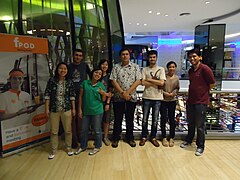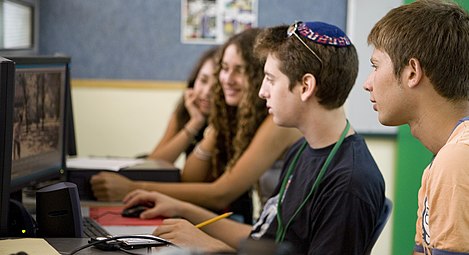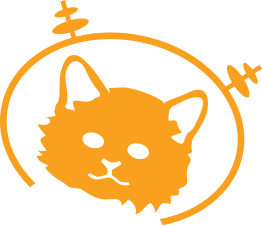User:MCruz (WMF)/Sandbox/Newsletter/2015/2/5
What needs do emerging Wikimedia communities have? Meet the Capacity Development Framework.
Participating communities:
The Wikimedia Foundation conducted qualitative research into strengths, challenges and needs of different communities. The aim? To further understand the breadth and scope of capacity needs in emerging communities. The first phase of this framework was community research. To this end, interviews were conducted with 16 emerging communities or countries through in-depth video and in-person interviews with a small group of community members. The research surfaced seven community capacities for development, based on the strengths, challenges or needs reported by those interviewed:
- New contributor engagement and growth
- Community governance:
- On-wiki technical skills
- Communications
- Partnerships
The report of this Phase 1 of Capacity Development Framework aims to define these seven capacities, in order to create a common vocabulary for future discussions, as well as to provide a non-exhaustive list of example actions for building these outlined capacities.
The second phase is focusing on creating separate, on-wiki spaces for each of the seven capacities, with the specific aim of discussing and clarifying central problems, existing solutions (from other communities), and potential future work (e.g. research, trainings, facilitated meetings, etc.). Following conversations with interested communities, specific action plans with goals, timelines, and evaluation plans will be developed collaboratively with those communities.
- Further reading:
- Contact: Asaf Bartov, Senior Program Officer, Wikimedia Emerging Communities; Sati Houston, Grants Impact Strategist.
A double release to better understand Wikimedia Programs.
Both products work together to advance movement-wide understanding of writing contests, their design and impact.
We have completed the data collection phase for the Wikipedia Programs Evaluation Reports 2015, and the first reports have now been released. In collaboration with grantees and program leaders across the movement, the reports have begun to cover over 700 implementations of 10 different types of programs, reported by at least 98 different program leaders from 59 countries. This second round of data represents twice as many countries, more than three times more program leaders reporting, and six times more program implementations. The goals of these reports are:
- To develop a clearer understanding of Wikimedia programs and their impact.
- To identify positive examples of programs to explore in more depth, in order to develop best practices and support networks across communities
- To help Wikimedia community leaders explore methods for improving the data collection and reporting of their programs.
- To highlight key lessons learned that can be applied to data collection and reporting.
Currently online are the reports on Editathons, Writing Contests, Wiki Loves Monuments and Other photo events.
The latest report, focused on Writing Contests on Wikipedia, was launched in early July, and it was released together with a program toolkit. While the evaluation report offers data on goals, inputs, outputs and outcomes of writing contests, the program toolkit brings out process and some best practices about this program. It complements the evaluation report offering a practical guide, focused on implementation. Both products work together to advance movement-wide understanding of writing contests, their design, and their impact. Join the conversation! Program leaders have a key role to play in this enterprise as we work to build out the toolkit through shared experiences, success and challenges.
- Further reading:
IdeaLab is a space where wikimedians all over the world share their inspiration with others.
Wikipedia has been popular in India since its initial years, especially as a source of information. Though a major number of edits from India are anonymous IP edits, India has produced some excellent editors as well. We need a conference like WikiConference India 2011 for national integration. Read more and get involved!
A simple import scheme for standardized data from census bureaus, to keep the imported values up to date. The method utilize the Wikidata project as a store for some identifying values, but accesses the data provider directly. Learn more about the project and how you can get involved!
Join the IdeaLab community. You can help develop ideas in many ways: with technical skills, translating, networking and more. Share your own!
The Learning and Evaluation team launched a new learning campaign about Community Health, that takes place from July 15 to August 15.
We want to capture community impressions on what makes a healthy community online. Share your views and participate in a drawing to win a Wikimania 2016 scholarship! On the campaign page, you will also find how people engaged at Community Engagement booth at Wikimania.
What makes you feel welcome on the wiki projects? What makes you feel like you don't belong here? What shared values bring us together online? These are some of the questions that we hope will bring out community views on this topic. Engage on a fantastic learning experience: Wikimania! Join us online as we launch this conversation about Community Health. Contribute a drawing or answer the questions below.
The PE&D team also hosts virtual meet-ups to launch new tools or share experience in using them.
Join the next virtual meet-up!
Share what you know with the PE&D Community.
Introduce yourself in the Community!
A program in the spotlight.
Coding da Vinci: the 10 weeks GLAM hackathon. Organized by Wikimedia Deutschland, OKF, Deutsche Digitale Bibliothek and DigiS
Coding da Vinci is a slightly different GLAM hackathon. First, it is run by 4 partners. Wikimedia Deutschland, Open Knowledge Foundation, Deutsche Digitale Bibliothek and DigiS. Already the partnership represents the linking of two worlds. On one side art & heritage institutions and on the other side developers and volunteers. At Coding da Vinci they both meet. They talk to and learn from each other. Second it includes a sprint. In 10 weeks out of more than 600,000 media files and 65 million metadata entries roundabout 100 coders, designers and art fans created 20 new projects. And third it has a fancy award ceremony.
It was a tough job to the jury to assign five prices. Out of competition was Rolling Stone, a web app making stones talk. Most funny was considered the online game Nürnberger Lebkuchen based on old gingerbread recipes. The Most technical award was assigned to the combined hardware-software installation Kurbelkamera (crank camera) giving its user the chance to became a movie star in 100 year old movies and share the new film on the net. The app Midiola was awarded for Best design, giving sound to silent punch cards from mechanical pianos. And finally in the category most useful was the plant identifier app Floradex, using 175,000 entries of the herbarium of Berlin's Botanical garden, founded in 1819. It gained the prize from the audience Everybody's darling as well.
Wikimedia Deutschland funds Coding da Vinci because it encourages GLAM institutions to define datasets under a free license. Many of them do this for the first time. We are integrating all this data into Wikimedia Commons. Coding da Vinci shows the potentials of free licenses to creativity. GLAMs can see the offspring of their collection in a new surrounding. This is motivating GLAMs shaping access to their collections compatible to Wikimedia Projects.
- Further reading:
- The web site of Coding da Vinci
- An English summary
- A video presentation in English
blogs, events & more!
Every month, we share knowledge with a focus on programs, process or tools on Wikimedia Foundation's blog. Find all our entries on the Wikimedia blog
Featured blog posts:
On May 13 and 14, Community Engagement teams at the Wikimedia Foundation collaborated with the Partnerships and Development team (ZEN) at Wikimedia Deutschland to host a series of workshops providing support to program leaders attending Wikimedia Conference 2015.
Read more.
The Wikimedia Community Resources team launched an Inspire campaign in March 2015 with two goals in mind: experiment with a proactive, challenge-based model for finding and funding impactful, community-driven projects; and increase gender diversity by inviting participation from women and allies to generate more initiatives and quality content aimed at filling Wikimedia’s gender gaps.
Read More
| July
| ||||||
| Mon | Tue | Wed | Thu | Fri | Sat | Sun |
| 1 | 2 | 3 | 4 | 5 | ||
| 6 | 7 | 8 | 9 | 10 | 11 | 12 |
| 13 | 14 | 15 | 16 | 17 | 18 | 19 |
| 20 | 21 | 22 | 23 | 24 | 25 | 26 |
| 27 | 28 | 29 | 30 | 31 | ||
July 15:
- Wikimania Mexico Learning Day in Mexico City.
- Launch of Community Health learning campaign (until August 15)
July 17 - 19: Wikimania 2015
July 30: APG Progress Reports due.
| August
| ||||||
| Mon | Tue | Wed | Thu | Fri | Sat | Sun |
| 1 | 2 | |||||
| 3 | 4 | 5 | 6 | 7 | 8 | 9 |
| 10 | 11 | 12 | 13 | 14 | 15 | 16 |
| 17 | 18 | 19 | 20 | 21 | 22 | 23 |
| 24 | 25 | 26 | 27 | 28 | 29 | 30 |
| 31 | ||||||
August 1: 2nd Phase of Community Capacity Development Framework begins.
August 15: Community Health learning campaign ends.
August 31 - September 29: Accepting proposals for Individual Engagement Grants - round 2 2015.
| September
| ||||||
| Mon | Tue | Wed | Thu | Fri | Sat | Sun |
| 1 | 2 | 3 | 4 | 5 | 6 | |
| 7 | 8 | 9 | 10 | 11 | 12 | 13 |
| 14 | 15 | 16 | 17 | 18 | 19 | 20 |
| 21 | 22 | 23 | 24 | 25 | 26 | 27 |
| 28 | 29 | 30 | ||||
September 10 - 13: Wikimedia CEE Meeting 2015
September 28: Impact Report due
September 29: Individual Engagement Grants closes submissions.

















